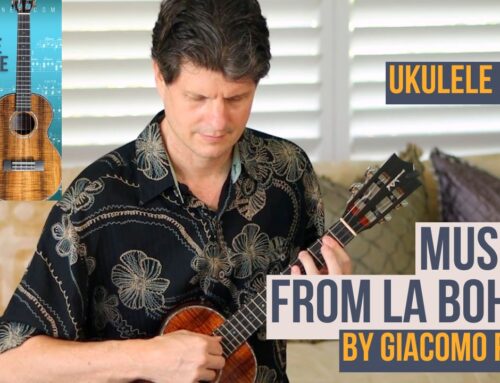What exactly does the Hawaiian word “ukulele” mean in English? The answer is not as straightforward as you might think. The history of the term and the instrument associated with it are open to some interpretation, in fact. We’ll need to take a few turns along the way to get to our destination.
A brief history
The jumping flea
Portuguese immigrants first arrived on Hawai’i in the 19th century to escape famine in their homeland. They arrived with some of their most popular musical instruments. One such instrument was the braguinha. Also known as the “machete de Braga,” the braguihna was a small four-stringed instrument from the archipelago of Madeira. When the SS Ravenscrag arrived at Honolulu harbor in 1879, it had just completed an over 12,000-mile journey. A certain talented musician named Joao Fernandes jumped off the ship and began to sing and play his machete to celebrate the ship’s safe arrival. Witnesses described Fernandes’s fingers dancing around the fingerboard like a “jumping flea” (an ‘ukulele). (Check out this great article by Sagor Nagyszalanczy for a wonderful narration of this part of the ukulele’s history.)
From machete to ukulele
The machete (or braguinha) used a different tuning from today’s ukulele. Instead of the traditional “my dog has fleas” (GCEA), the machete was tuned DGBD. Soon after the instrument arrived in Hawaii, however, the tuning was changed to the re-entrant (high-G) GCEA and the name “ukulele” stuck. Credit of the design of the ukulele goes to three Portuguese cabinet makers from Madeira who settled on O’ahu named Manuel Nunes, José do Espírito Santo, and Augusto Dias. As the machete became the ukulele, it became a very popular instrument across Hawai’i thanks especially to King David Kalakaua and, later, Queen Lili’uokalani. (Go here to find out more about Queen Lili’uokalani and her rich contribution to the ukulele.)
The gift that came here
There is another meaning for the term ukulele, however, given by Queen Lili’uokalani. While the traditional history of the ukulele concerns the Hawaiian word ‘ukulele, we have an entirely different word if we remove the ‘okina (‘) at the beginning of the word. Ukulele combines “uku” (not ‘uku) and “lele” to give us “the gift” (uku) “that came [here]” (lele). Queen Lili’uokalani’s version of the word thus places emphasis on the gift of this wonderful instrument from the Portuguese to the Hawaiian islands.
Which is right?
So, which is the correct translation of ukulele—”jumping flea” or “the gift that came here”? At the end of the day both meanings are integral to the ukulele’s rich history. Moreover, both indicate a blending of two cultures to make up something new.
How do you pronounce ukulele?
Finally, let’s go over the correct Hawaiian pronunciation of the term. While many mainlanders pronounce it “Yoo-kuh-lay-lee,” the correct Hawaiian pronunciation is “oo-koo-leh-leh.” Check out this great article on why it might be important to pronounce ‘ukulele the Hawaiian way. Whether you use the traditional or Queen Lili’uokalani’s spelling of the word, both will have the same basic pronunciation.




Thank you for this very interesting history!
You’re most welcome, Brooke! Glad you enjoyed it.
Peace,
Dave B (UC team)
Excellent! Iʻm going to share this with the Garden Island (Kauai) Arts Council this evening. BTW, E KaniKapila Kakou (EKK) will take place this year on Kauai starting at the end of March, 2022! Exciting news!!!!
Lyn McNutt, Kauai
Mahalo for the article. Fun to read and learn. Aloha.
Very interesting. Thank you. I will never mispronounce the name of my instrument again.